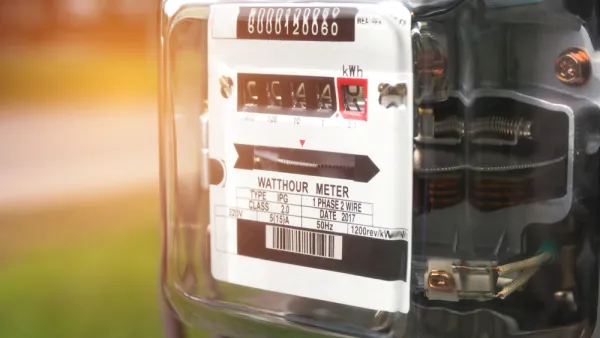It may seem counter-intuitive to charge extra fees for the cleanest, most fuel-efficient vehicles on the road today - including those that qualify for a federal $7,500 credit. But ten states are doing just that to keep roads well-funded.
Raven Clabough explores the controversy behind charging annual fees for hybrid vehicles - including hybrid SUVs, as well as vehicles that run on electricity, not gasoline or diesel, and thus pay no fuel taxes, to supplement gas tax revenue.
Rightly or wrongly, hybrids and electric vehicles (EVs) are taking some blame by state legislators for decreasing fuel tax revenues. The Institute on Taxation and Economic Policy "estimates that state and local gas-tax revenue fell 7 percent to $38 billion between 2004 and 2010."
Both hybrid and electric vehicle sales have indeed been increasing, perhaps making them an easy target for legislators less willing to increase gas taxes or devise new vehicle-miles-traveled (VMT) fee programs that would be applied to all vehicles.
Last year, Toyota Motor Corp. sold 236,659 Prius hybrids, a 73-percent increase from 2011. Likewise, General Motors doubled its sale of hybrids last year.
The Electric Drive Transportation Association reports a 41% increase in March sales over February, bringing the total of all plug-in vehicles sales since December, 2010 to more than 100,000.
"I think so far what we're seeing is the trend seems to be either an additional annual fee or some type of registration fee seems to be much more popular than the miles-driven tax, because that is a newer technology and raises some privacy concerns," said Kristy Hartman, a transportation and environment analyst for the National Conference of State Legislatures.
Arizona state Senator Steve Farley, a Democrat from Tucson who wrote a bill to tax electric cars, explains:
"The intent is that people who use the roads pay for them. Just because we have somebody who is getting out of doing it because they have an alternative form of fuel, that doesn't mean they shouldn't pay for the roads."
Republican North Carolina Senator Neal Hunt supported "an additional $100 annual registration fee for electric car owners and a $50 fee for hybrid drivers", asserting "that the provision is the best way to insure that all drivers are contributing their fair share." The bill is pending in the N.C. House.
"It just seems logical to me that they should pay a small fee for the use of the highways and the wear and tear they put on the highways," he said.
Electric vehicle proponents look to the VMT fee as the best way to charge EV users for road funding. However, one group doesn't categorically rule-out exclusive fees.
According to Jay Friedland, legislative director for the advocacy group Plug In America, legislators should be asking fuel efficient drivers to pay their fair share through additional fees, but should wait until the number of alternative-fuel vehicles reaches 100,000. North Carolina presently has approximately 30,000 registered hybrids and electric cars.
The push to tax EV and hybrid drivers might be more justifiable if those same states were attempting to increase gas taxes rather than just looking to increase revenue from a small group of motorists driving, for the most part, cleaner, more fuel-efficient vehicles. Regrettably, that has not been the case. In fact, this year Virginia passed a new, annual hybrid/EV fee of $64 while eliminating its state gasoline excise tax of 17.5-cents. The new 3.5% wholesale sales tax on fuel will result in reduced gas tax revenue.
To view a state's laws and incentives related to alternative fuels and advanced vehicles, go to the U.S. Department of Energy's Alternative Fuels Data Center, select Laws & Incentives, click on "State Incentives and Laws", and select a state from the map or menu.
FULL STORY: States Propose Fees on Hybrids to Cover Gas Tax Losses

Analysis: Cybertruck Fatality Rate Far Exceeds That of Ford Pinto
The Tesla Cybertruck was recalled seven times last year.

National Parks Layoffs Will Cause Communities to Lose Billions
Thousands of essential park workers were laid off this week, just before the busy spring break season.

Retro-silient?: America’s First “Eco-burb,” The Woodlands Turns 50
A master-planned community north of Houston offers lessons on green infrastructure and resilient design, but falls short of its founder’s lofty affordability and walkability goals.

Test News Post 1
This is a summary

Analysis: Cybertruck Fatality Rate Far Exceeds That of Ford Pinto
The Tesla Cybertruck was recalled seven times last year.

Test News Headline 46
Test for the image on the front page.
Urban Design for Planners 1: Software Tools
This six-course series explores essential urban design concepts using open source software and equips planners with the tools they need to participate fully in the urban design process.
Planning for Universal Design
Learn the tools for implementing Universal Design in planning regulations.
EMC Planning Group, Inc.
Planetizen
Planetizen
Mpact (formerly Rail~Volution)
Great Falls Development Authority, Inc.
HUDs Office of Policy Development and Research
NYU Wagner Graduate School of Public Service



























